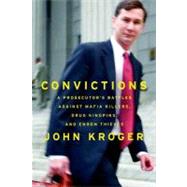
| Prologue: Waiting for a Verdict | p. 3 |
| Rookie | |
| The Making of a Prosecutor | p. 11 |
| The Code of Silence Murders | p. 22 |
| The Teddy Bear Burglary | p. 42 |
| Operation Badfellas | p. 69 |
| The Human Factor | p. 103 |
| Mafia Prosecutor | |
| The Scarpa Crew and the FBI | p. 127 |
| Hitmen | p. 156 |
| A Mafia Murder Trial | p. 174 |
| How We Beat the Mob | p. 210 |
| The War on Drugs | |
| Wiretaps | p. 237 |
| Bushwick | p. 252 |
| Hunting "The Puma" | p. 273 |
| The Dark Side | p. 306 |
| How to Win a War on Drugs | p. 327 |
| 9/11: Emergency Response | p. 341 |
| Enron: White-Collar Crime | |
| The Enron Debacle | p. 369 |
| The Broadband Scam | p. 386 |
| Getting Away with Fraud | p. 418 |
| The Fastow Dilemma | p. 434 |
| Epilogue: New Beginnings | p. 451 |
| Sources | p. 455 |
| Acknowledgments | p. 465 |
| Table of Contents provided by Ingram. All Rights Reserved. |
The New copy of this book will include any supplemental materials advertised. Please check the title of the book to determine if it should include any access cards, study guides, lab manuals, CDs, etc.
The Used, Rental and eBook copies of this book are not guaranteed to include any supplemental materials. Typically, only the book itself is included. This is true even if the title states it includes any access cards, study guides, lab manuals, CDs, etc.
Excerpted from Convictions: A Prosecutor's Battles Against Mafia Killers, Drug Kingpins, and Enron Thieves by John Kroger
All rights reserved by the original copyright owners. Excerpts are provided for display purposes only and may not be reproduced, reprinted or distributed without the written permission of the publisher.